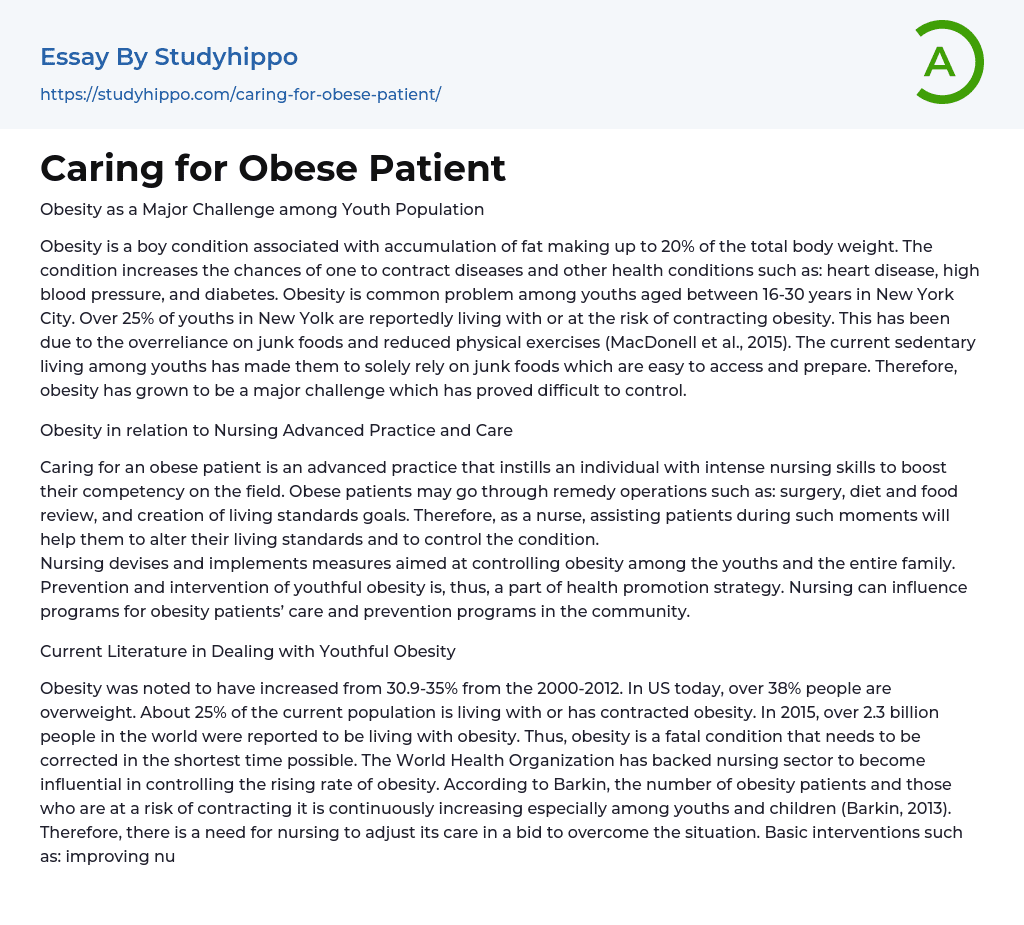Obesity as a Major Challenge among the Youth Population
Young people face a major challenge in the form of obesity, which refers to having an excessive amount of body fat comprising up to 20% of total weight. This condition poses various health risks including heart disease, high blood pressure, and diabetes. In New York City, over 25% of individuals aged 16-30 are affected by obesity, placing them at significant risk.
According to MacDonell et al. (2015), the increase in obesity is linked to excessive consumption of unhealthy food and decreased physical activity, particularly among young individuals. This habit results in a strong reliance on easily available and convenient junk food choices, making it challenging to address the issue of obesity.
The Significance of Obesity in Advanced Practice Nursing and Care
Acquiring advanced nursing skills is essential for effectively treating obese patients an
...d improving competence in this field.
Nurses have a crucial role in assisting obese patients to improve their quality of life and handle their condition. They achieve this through various methods such as surgery, evaluating diets and food intake, and establishing goals for healthy living. By addressing obesity, nursing greatly contributes to promoting the well-being of individuals and families overall. Tackling childhood obesity is a vital part of our comprehensive health promotion strategy. Additionally, nurses possess the capability to develop care programs for obese patients and implement prevention initiatives within the community.
The Current Literature on Youth Obesity
The prevalence of obesity has experienced a notable increase, with rates climbing from 30.9% to 35% between 2000 and 2012. In the United States, over 38% of individuals are presently categorized as overweight. Approximately one-fourth of the population i
currently impacted by or enduring obesity. Global data demonstrates that in 2015, there were more than 2.3 billion people worldwide living with obesity. Consequently, it is crucial to prioritize initiatives targeting this potentially perilous state of being.
According to Barkin's (2013) report, the World Health Organization has authorized the nursing sector to contribute towards tackling the growing issue of obesity. The rise in obesity rates, especially among young individuals and children, presents a continuous health hazard. Consequently, nursing care must adjust to confront this problem. It becomes crucial to concentrate on interventions such as enhancing accessibility to nursing care, advocating for effective obesity management, and promoting physical activity to effectively address this matter.
Theoretical Framework for Obesity Prevention
An effective theoretical framework for preventing obesity should include interventions that target the underlying causes of obesity. These interventions aim to educate young individuals about the importance of adopting healthy diets and engaging in physical activity to prevent and manage obesity (MacDonell et al., 2015). To ensure comprehensive education, it is important to implement initiatives such as promoting physical activities and providing nutrition training programs within New York City. Furthermore, establishing sports facilities in the city will create an environment that promotes regular exercise (MacDonell et al., 2015). Additionally, teaching social skills to society at large is crucial.
This will improve home-based care for obese patients who have caregivers.
Evaluation Plan
An experimental evaluation method will be used to assess the effectiveness of the intervention. This involves sending a designated group of nurses to provide obesity care to a select group of community patients. The outcomes will be evaluated in terms of cost, time, and other resources. This evaluation will help determine how
effective the intervention is and its impact on the budget.
The text includes a list of references for two articles:
1) Barkin, S.L.'s (2013) study on the relationship between executive function and obesity in children and adolescents as reviewed systematically in the Journal of Obesity.
2) MacDonell, S.O., Miller, J.C., Waters, D.L., & Houghton, L.A.'s work from 2015. The specific details about this article are not mentioned in this context.
Obesity in older adults is a prevalent issue that poses health risks and requires management of care among nursing home residents (Current Geriatrics Reports, 4(3), 211-220).
- Adoption essays
- Aunt essays
- Babies essays
- Bedroom essays
- Caring essays
- Children essays
- Daughter essays
- Divorce essays
- Dog essays
- Dysfunctional Family essays
- Family Tradition essays
- Family Values essays
- Father essays
- Foster Care essays
- Friends essays
- Grandparent essays
- Home essays
- Hometown essays
- Husband essays
- Jealousy essays
- Love essays
- Marriage essays
- Mother essays
- Online Dating essays
- Parenting essays
- Parenting Teens essays
- Parents essays
- Relationship essays
- Room essays
- Sibling essays
- Sister essays
- Wedding essays
- Wife essays
- Causes Of Obesity essays
- Children Obesity essays




